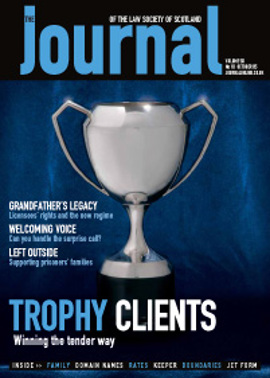Outside in

Think of victims of crime, or witnesses, and a raft of measures or strategies spring to mind, directed at providing support through a traumatic experience. Ask what is being done for prisoners and you discover programmes for treatment, rehabilitation, education – and perhaps some controversy as to whether the right balance is struck between provision for offenders and their victims.
But there is another group on whom offending has a severe impact, who come a poor last in terms of public support. Housing, benefits, social stigma or even the very real obstacles in visiting a relative suddenly removed to custody – for the prisoner’s own family, support can be hard to find except through a part time helpline run from a small basement office in Edinburgh.
The Scottish Prisoners’ Families Helpline is the public face of Families Outside, established as a charity and company limited by guarantee three years ago out of an earlier forum involving the prison service, social work departments and the like. “One of the key things they recognised was that families just don’t get the information they need to cope and make sense of what’s happening to them”, says Director Angela Morgan, explaining how the helpline came into being. Previously reliant on volunteers, it took off when she secured a support worker, through whom the service now attracts almost 2,000 calls a year.
“Increasingly there are lots of complex issues that come up through calls and quite often it’s listening that’s the most important part of the service, so we wanted to give a message out to families that we do more than provide information”, Morgan comments.
Problems in combination
Their remit is a broad one. “We quite deliberately use the term ‘families affected by imprisonment’, because our role is to support, and families for example who don’t maintain contact with the prisoner are also experiencing the impact, so it’s a different starting point and in that sense we are completely unique.”
In a recent survey of families, concerns for the prisoner’s welfare (from possible suicide risk, to what would happen after release) scored the highest – between 60 and 90% of those polled. But a range of other issues, usually several at once, impacted on a third or more of all families: timing of visits, transport and its cost, general lack of information and support, financial concerns, and the basic problem of what to tell friends and neighbours. Housing, media attention, loss of friends and worry about the family (especially support for children) attracted lesser but still significant scores; employment came lowest with 6%.
The research, commissioned two years ago by the organisation along with the Tayside Criminal Justice Partnership, aimed to identify which services would best support families with a view to the eventual successful rehabilitation of the offender. It showed the general lack of information in sharp relief. None of the families had heard of Families Outside, or the helpline, prior to receiving the research questionnaire – including one woman who had called the Samaritans. None appeared to have heard of a Family Contact Development Officer – now the Prison Service’s link with families. All agreed that they just needed to know where they could go for information, so they could decide for themselves what they wanted to do.
This applied as much to those who felt they were better off following the prisoner’s incarceration – often those otherwise subjected to threats and violence, or constant manipulation or financial demands, usually to feed addictions, from family members now in custody. “The fear from one or two participants was tangible”, the survey recorded.
The quest for information seemed to be a constant battle. One participant in a telephone interview said families were “just left completely in the dark… [it’s] always ‘pass the buck, pass the buck’… like nobody cares”.
Keep our helpline cards
Solicitors whose work focuses on the offender and the events leading to conviction, may feel that the family’s interests are somewhat peripheral. Angela Morgan appreciates this, but believes that legal advisers will still find themselves in situations where they can make a difference to a family.
“Certainly having awareness of the need and of the existence of the helpline for families”, she responds when asked how the profession can help. “I suppose what we want to say is, we recognise you’re very busy people, it isn’t part of your job to spend lots of time with distressed families, but please have a pocketful of our helpline cards and hand them out.”
“Solicitors might not always know who the family are, we appreciate that, but sometimes they do know the family wants to maintain contact or be involved with the prisoner.” Or the family may phone them to find out what has happened.
She does have one important request. “We do get a sense that sometimes solicitors play down the likelihood of a custodial sentence, maybe because that keeps things calmer, but it’s actually not helpful because it means that families are even less prepared for their relative disappearing to prison. So we would make a plea for people to think about the impact of that, because quite a lot of people do say to us, oh the solicitor said he wouldn’t get sent down.”
A wall of ignorance
You might think that offenders’ families would tend to be those already receiving social work support. But not necessarily. In fact, Families Outside’s experience is that social work departments often have limited experience of such families. “Part of the work when a call comes in is assessing who else is involved with the family and whether they could offer support, and sometimes that’s social work and sometimes it’s nobody, and generally I have to say it’s nobody. They don’t automatically get any support.”
Under a new throughcare strategy where someone is serving a sentence of more than four years, the family have to be contacted by the prison social worker for an early meeting to explain what will happen during the sentence, with some ongoing contact afterwards. “This is recognition that families are often the biggest resource when somebody comes out of prison,” Morgan comments, “so it’s worth finding out if the family are able to provide support, but it doesn’t mean that the family are automatically going to get the support that they need. They might get an assessment but it doesn’t actually mean that they’ll get services, so we’re a long way off any real sort of guaranteed support.”
Much of the helpline’s function is simply signposting callers to the right support organisations for their particular needs. As Morgan puts it: “We have our key agencies but we don’t claim to be experts in anything other than helpful listening, because that’s the key thing that people actually want.”
The need can be equally great with shorter as with longer sentences. “It’s anything from being on remand, which has its own needs”, says Morgan. This applies especially to children, she adds: international research relates the impact to the trauma of the loss rather than the length of sentence. Support is crucial in getting the prisoner back on their feet – “but in order to do that effectively, that support needs to have happened from the beginning of the sentence so you’ve been involved with the entire sentence management process… Of course its not appropriate for every family and their relative in prison to maintain contact but we know that many families are desperate to make a contribution to the care and resettlement of their relative”.
Struggling to keep in touch
Significantly, three of the eight factsheets already published by Families Outside (available on their website www.familiesoutside.org.uk) concern prison visits and the major practical difficulties that arise in exercising visiting rights. Another survey in 2003 covered the seven (out of 15) prisons in Scotland considered the least accessible. It revealed that 46% of visitors relied on public transport and over 30% had to use more than two different modes of transport. Over half took more than five hours to make the round trip including the visit, and 18% needed more than 12 hours. Often travelling with young children, costs were high and little over half of those surveyed had heard of the Assisted Prison Visits Scheme, even if they qualified for financial help.
Then there are the rules about what you can take and what you can do. For example a visitor may be able to buy a bag of crisps but not to share them. “That’s just an obvious thing you might want to do if you weren’t told those things, and it’s best to be told in advance because visits are stressful enough. There are big expectations often on both sides”, says Morgan.
Attitudes can make all the difference, she adds. “At the end of the day imprisonment for a family member will always cause trauma. Nobody can avoid that, it’s part of the process, but there are some fundamental things, about information, about transport, about the attitude towards people and families, which is something that doesn’t cost any money and which families say makes all the difference. They feel guilty even though they’ve not been charged with the crime; they feel isolated; they feel stigmatised. And then if they get people in the criminal justice system treating them as if, we’ve had it said to us, as if they’re criminals as well, it just exacerbates all that stress.”
What it amounts to, in the end, is a little understanding. “The comment I hear most often is, thank you for listening”, Morgan concludes. “I think that sums up what we’re doing really: it comes down to people wanting that support, whether it’s practical or emotional. Because they’re not recognised by anybody else.”
WHY THEY NEED HELP
Comments from the Tayside research
“[I have had] no support from [family] as they think I should just have walked away. I understand this but feel a bit let down as I have been there for them when they had bad times in their lives.”
“My family and friends don’t agree with me standing by my partner, therefore I don’t have any support.”
“I don’t feel that I get enough time to spend with my partner as I would like. I think it would be a good idea if he had less visits but more time on one visit as I cannot afford to travel all the time, and he can’t afford to phone me a lot.”
“My son is full of good ideas and intentions when he phones me from prison but when he is home for the weekend visits all his good intentions go out the window. It can be stressful.”
FAMILIES OUTSIDE: www.familiesoutside.org.uk
Scottish Prisoners Families Helpline: 0500 83 93 83 (Freefone)
In this issue
- Back on the home front
- Exchanging the "missive"
- Perfect pitch
- Tales from the court
- The going rate
- Licence please
- "Your call is important to us..."
- Wake up to .eu
- Know your boundaries
- Outside in
- Checks and balances
- Policy and practice
- Supporting credentials
- Infrastructure: who pays?
- Protective awards unprotected
- Website reviews
- Book reviews
- New terms for old
- Keeper's corner






